
There was an iron bed with clean sheets, a wool blanket, a white chenille bedspread and a handmade quilt at the foot. In the corner was a nightstand holding a lamp, a Gideon Bible and a book of Edgar Allen Poe’s short stories and poems. Against the left wall was a chest of drawers with two neatly folded clean towels on top. Across the room, a small armoire and opposite the bed was a secretary with a dropdown writing area and a straight-back chair. In this second-story corner room there was also an overstuffed chair and two windows, one facing north and one to the east. The room was small but by 1942 boarding house standards it was larger than most and meticulously clean.
He emptied his duffle bag onto the bed and squirreled away his underwear, socks and shirts in the chest of drawers. Hanging his extra pants and leather coat in the armoire he noticed a place at the top for a suitcase. Not having a suitcase, he hung his duffle bag on the inside hook. With a can of black Kiwi shoe polish, he gave his boots a quick shine. Finished, he set them on the floor at the end of the bed, turned the overstuffed chair 180 degrees between the two windows and sat quietly taking in the view to the north and to the east.
For a thousand miles in both directions there was an ocean of buildings he didn’t recognize. Wondering where it all ended overpowered the mind. This was the middle of Los Angeles six months after World War II had been declared and to find the edge of the city would have been an adventure in futility. Unaccustomed to the immensity of the sprawl, his first feeling was that of being alone, very alone. “Did everyone in this anthill feel this alone?” he wondered to himself.
He wasn’t complaining, just wondering. It was all what he had expected. In fact, it was better than he expected. This boarding house room was the third one he looked at and he took it immediately when he found there was an unused small garage where he could keep his 45 c.i. Harley out of the weather.
Thinking about the Harley his gaze lowered from the horizon to the garage that housed the bike. To him it was the perfect motorcycle because it was exactly like the Harleys the factory was making for the Army. Owning it made him feel like he too was a soldier. He wanted to be a soldier. He had tried to enlist the day after Pearl Harbor. At 19 he was the right age, he was strong and educated but his lungs were suspect and to his disgrace he was given a medical deferment.
Being 4F was the reason he’d bought the motorcycle, left his hometown and had come to Los Angeles… to work in a defense plant. He may not be a rifle-carrying soldier but no one could say he wasn’t doing his part for the war effort.
The day he arrived in Los Angeles he got a job at North American Aviation where they said he would be building fighter planes, P51 Mustangs. The next day he found a room in this boarding house. Tomorrow would be his first day at the plant. Now he sat in the overstuffed chair, taking in the skyline, trying to get acclimatized to the big city. It was certainly different from his tiny hometown in Oklahoma and he wondered if anyone ever really got acclimatized to anything this large.
With the room came a sit-down supper, coffee and roll in the morning and a box lunch. There was time before dinner and with his unpacking finished he sat quietly in the big chair eventually drifting off for a well-deserved nap.
Mrs. McFadden’s Boarding House was run by the widow McFadden, a sturdy, independent, self-reliant woman who ran a tight ship, took no guff from anyone, accepted permanent boarders only after a temporary week’s tryout and was admired by everyone. Her boarders got the best food, clean sheets once a week, clean rooms twice a week and clean towels every day. The boarding house had six paying tenants plus Mrs. McFadden and Maggie, a young woman who helped run the place.
At about five o’clock he awoke from his nap, put on a clean shirt, his polished boots and went downstairs for dinner. Being the last to arrive Mrs. McFadden formally introduced him to the other tenants, showed him to a seat and then with help from Maggie, served dinner. Courteously, everyone waited for Mrs. McFadden and Maggie before starting and when the ladies sat they were helped with their chairs.
Eventually, as each roomer finished eating they politely asked to be excused. Mrs. McFadden granted permission and it reminded him of the proper manners and etiquette required at his grandmother’s house.
Mrs. McFadden began a conversation, “Our new boarder is here to work at North American.” Maggie nodded. “He’s from Oklahoma.” Maggie nodded again. “I let him have the garage for his motorcycle.” Maggie smiled.
Confirming the facts with a nod he then responded, “I understand the Bible but why does my room have a copy of Edgar Allen Poe?”
“The Gideons offered us a free Bible for each room. I accepted. But my husband was an atheist and a voracious reader so rather than force religion on the boarders he decided to give them a choice by putting a copy of classic literature next to the Bible. Your room has Poe, in the others are Hemingway, Whitman, Thoreau, Melville and Mark Twain. I keep it that way. It reminds me of him.”
Later sitting in his room watching all the lights of the city there was a tiny knock at the door. It was Maggie. “Do you really have a motorcycle?” She asked.
“Yes, a Harley-Davidson.”
“I love motorcycles. I used to ride on the back of my brother’s. I miss it.”
“Yea, motors can be a lot of fun. Mine is like the army bikes from the factory.”
“If you wouldn’t think I’m too forward, would you consider giving me a ride sometime?”
“Sure, but, there is no back seat, just a luggage rack. Mine has a military sidecar attached.”
“That sounds positively elegant.”
On a Saturday, with Maggie ensconced in the sidecar, they rode down to the beach for a picnic.
Passing Mrs. McFadden’s weeklong trial, he became a full-time boarder and with Maggie as his sidecar passenger and new friend he no longer felt alone. Doing his part at the defense plant building fighter planes he was proud of his new life as a civilian soldier.


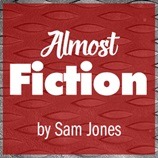
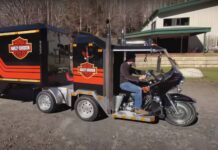
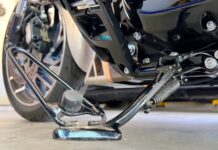
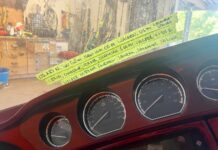

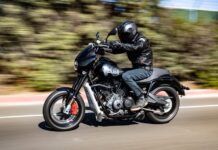
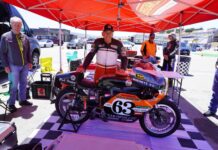










[…] love your stories in THUNDER PRESS! Your recent “Boarding House” story seemed to end abrubtly on page 18. There was no end of story watermark at the end, and […]